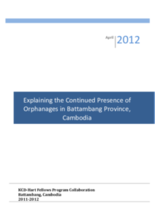A 2011 UNICEF report revealed that amongst the 12,000 children in Cambodia’s orphanages, almost three quarters of them have one living parent. The number of children in care has more than doubled in five years despite the National Policy on Alternative Care for Children adopted by the Kingdom of Cambodia in 2006 which “aims to ensure that children grow up in a family and in a community environment that promotes the principle that institutional care should be a last resort and a temporary solution for children”.
In Cambodia’s northwest province of Battambang, the number of orphanages registered with the Ministry of Social Affairs, Veterans and Youth Rehabilitations (MoSVY) has more than tripled from 11 to 42 since 2000. The study highlights that poverty and the inability of parents/families to ensure proper access to food, healthcare, and education, have resulted in the placement of children in institutions. Access to education seems to be one of the strongest factors for placement.
Participants and conductors of the research stressed that better communication of the expectations of the 2006 Ministry of Social Affairs’ Policy on Alternative Care for Children and the institutional requirements of accepting a child is needed to ensure the emotional and physical wellbeing of the child. Moreover, extended follow-up of each child was emphasized in order to better help reintegrate children into families within their community. Specifically, follow-ups to ensure that the child’s right to education is upheld and evaluate the suitability of family placement over a period of several years were recommended to tackle the problem of increasing numbers of orphanages in Battambang province of Cambodia.
This research study complements a previous study on attidues towards residential care in Cambodia.

